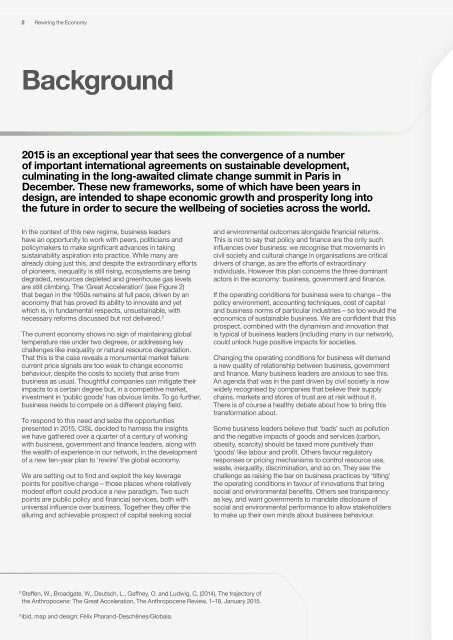Rewiring the Economy
1CfQ4ZO
1CfQ4ZO
You also want an ePaper? Increase the reach of your titles
YUMPU automatically turns print PDFs into web optimized ePapers that Google loves.
2<br />
<strong>Rewiring</strong> <strong>the</strong> <strong>Economy</strong><br />
Background<br />
2015 is an exceptional year that sees <strong>the</strong> convergence of a number<br />
of important international agreements on sustainable development,<br />
culminating in <strong>the</strong> long-awaited climate change summit in Paris in<br />
December. These new frameworks, some of which have been years in<br />
design, are intended to shape economic growth and prosperity long into<br />
<strong>the</strong> future in order to secure <strong>the</strong> wellbeing of societies across <strong>the</strong> world.<br />
In <strong>the</strong> context of this new regime, business leaders<br />
have an opportunity to work with peers, politicians and<br />
policymakers to make significant advances in taking<br />
sustainability aspiration into practice. While many are<br />
already doing just this, and despite <strong>the</strong> extraordinary efforts<br />
of pioneers, inequality is still rising, ecosystems are being<br />
degraded, resources depleted and greenhouse gas levels<br />
are still climbing. The ‘Great Acceleration’ (see Figure 2)<br />
that began in <strong>the</strong> 1950s remains at full pace, driven by an<br />
economy that has proved its ability to innovate and yet<br />
which is, in fundamental respects, unsustainable, with<br />
necessary reforms discussed but not delivered. 2<br />
The current economy shows no sign of maintaining global<br />
temperature rise under two degrees, or addressing key<br />
challenges like inequality or natural resource degradation.<br />
That this is <strong>the</strong> case reveals a monumental market failure:<br />
current price signals are too weak to change economic<br />
behaviour, despite <strong>the</strong> costs to society that arise from<br />
business as usual. Thoughtful companies can mitigate <strong>the</strong>ir<br />
impacts to a certain degree but, in a competitive market,<br />
investment in ‘public goods’ has obvious limits. To go fur<strong>the</strong>r,<br />
business needs to compete on a different playing field.<br />
To respond to this need and seize <strong>the</strong> opportunities<br />
presented in 2015, CISL decided to harness <strong>the</strong> insights<br />
we have ga<strong>the</strong>red over a quarter of a century of working<br />
with business, government and finance leaders, along with<br />
<strong>the</strong> wealth of experience in our network, in <strong>the</strong> development<br />
of a new ten-year plan to ‘rewire’ <strong>the</strong> global economy.<br />
We are setting out to find and exploit <strong>the</strong> key leverage<br />
points for positive change – those places where relatively<br />
modest effort could produce a new paradigm. Two such<br />
points are public policy and financial services, both with<br />
universal influence over business. Toge<strong>the</strong>r <strong>the</strong>y offer <strong>the</strong><br />
alluring and achievable prospect of capital seeking social<br />
and environmental outcomes alongside financial returns.<br />
This is not to say that policy and finance are <strong>the</strong> only such<br />
influences over business: we recognise that movements in<br />
civil society and cultural change in organisations are critical<br />
drivers of change, as are <strong>the</strong> efforts of extraordinary<br />
individuals. However this plan concerns <strong>the</strong> three dominant<br />
actors in <strong>the</strong> economy: business, government and finance.<br />
If <strong>the</strong> operating conditions for business were to change – <strong>the</strong><br />
policy environment, accounting techniques, cost of capital<br />
and business norms of particular industries – so too would <strong>the</strong><br />
economics of sustainable business. We are confident that this<br />
prospect, combined with <strong>the</strong> dynamism and innovation that<br />
is typical of business leaders (including many in our network),<br />
could unlock huge positive impacts for societies.<br />
Changing <strong>the</strong> operating conditions for business will demand<br />
a new quality of relationship between business, government<br />
and finance. Many business leaders are anxious to see this.<br />
An agenda that was in <strong>the</strong> past driven by civil society is now<br />
widely recognised by companies that believe <strong>the</strong>ir supply<br />
chains, markets and stores of trust are at risk without it.<br />
There is of course a healthy debate about how to bring this<br />
transformation about.<br />
Some business leaders believe that ‘bads’ such as pollution<br />
and <strong>the</strong> negative impacts of goods and services (carbon,<br />
obesity, scarcity) should be taxed more punitively than<br />
‘goods’ like labour and profit. O<strong>the</strong>rs favour regulatory<br />
responses or pricing mechanisms to control resource use,<br />
waste, inequality, discrimination, and so on. They see <strong>the</strong><br />
challenge as raising <strong>the</strong> bar on business practices by ‘tilting’<br />
<strong>the</strong> operating conditions in favour of innovations that bring<br />
social and environmental benefits. O<strong>the</strong>rs see transparency<br />
as key, and want governments to mandate disclosure of<br />
social and environmental performance to allow stakeholders<br />
to make up <strong>the</strong>ir own minds about business behaviour.<br />
2 <br />
Steffen, W., Broadgate, W., Deutsch, L., Gaffney, O. and Ludwig, C. (2014), The trajectory of<br />
<strong>the</strong> Anthropocene: The Great Acceleration, The Anthropocene Review, 1–18, January 2015.<br />
3<br />
ibid, map and design: Félix Pharand-Deschênes/Globaia.


